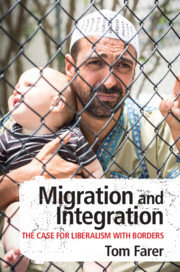‘This short cri de coeur, by a brave liberal lion unafraid to tackle liberal pieties, casts a long shadow across the right/left spectrum. Farer argues that rich states have a legal and moral right to bar migrants from the Global South and that tolerant national communities are worth defending - even if it takes biometric identity cards, off-shore sites for asylum claims, and litmus tests for determining entry. Not everyone will embrace his prescriptions but all will benefit from his thoughtful defense of liberal nationalism. His book sets the standard for thoughtful and eloquent commentary on the age's most inflammatory subject.'
José E. Alvarez - Herbert and Rose Rubin Professor of International Law, New York University
‘Farer is one of the sharpest legal minds of our era, with an unsurpassed ability to combine fierce liberalism with the unique ability to bring imagination into fundamental issues of our time. He broadens and deepens our field of vision, challenging us constantly to think creatively. This book is an excellent example of his inquisitive mind.'
Claudio Grossman - Member of the UN International Law Commission, Dean Emeritus at American University
‘An indispensable response to the migration challenge that is at once humane and intelligently sensitive to the delicate issues at stake. I consider Tom Farer's brilliantly reasoned and lucidly written argument for a liberal nationalist-solution-oriented approach to migration as required reading for anyone concerned with preserving robust democracies in Europe and North America.'
Richard Falk - Princeton University, New Jersey and author of Power Shift: On the New Global Order
‘The moderate center in American and European politics is bleeding votes to the right and the left because it has failed to come up with realistic policies on migration. Tom Farer, a distinguished human rights defender and international lawyer, addresses this challenge head-on with a witty, erudite, and passionate defense of a ‘liberalism with borders' – a migration policy that reconciles human rights and national sovereignty in a tough-minded yet compassionate synthesis which deserves to redefine the debate on this key issue in modern politics.'
Michael Ignatieff - President and Rector, Central European University, Budapest
‘Tom Farer's deeply researched, elegantly written, and humane book Migration and Integration confronts the question of how well-to-do, well-functioning countries in the North, particularly in Europe, should cope with the migration crisis. What should they do about the large numbers of people of diverse ethnic and religious backgrounds who are leaving or fleeing turbulent, dangerous, and impoverished countries of the Global South to settle among them? Should the countries of the North accommodate the ‘looming wave' of migrants? Can Europe's predominantly secular societies absorb and integrate millions of Muslim migrants while maintaining the best attributes of their own societies, including those that have become liberal cultural norms? Professor Farer is unblinking in describing the difficulties. He does not evade any hard questions. Asserting that ‘My highest priority is the survival of liberal democracy, an outcome by no means assured', his thoughtful answers are based on that priority. Tom Farer's important book is essential reading for those who share that priority.'
Aryeh Neier - Open Society Foundations and Founding Director of Human Rights Watch
‘Tom Farer has produced … the best possible statement of the liberal nationalist approach to migration and integration. It is, as it claims, ‘liberalism without tears, conservatism without hate'. Farer argues that liberal democrats can meet the challenge of twenty-first-century mass migration, but only if they can rediscover the courage of their convictions while shedding policy dogmatism. The stakes could not be higher.'
Tom Pegram - University College London
‘A timelier and better case for a liberal nationalism than Tom Farer's account cannot be imagined.'
Monica Serrano - El Colegio de Mexico
‘Farer (Univ. of Denver) offers a conventional analysis of migration and integration through the lens of the liberal political tradition.’
A. H. Fabos
Source: Choice
'… leaves readers with further knowledge on today’s migration crisis, proposals for solutions, and the ambition to preserve liberal democracy for future generations.'
Quinn Muscatel
Source: AmeriQuests



